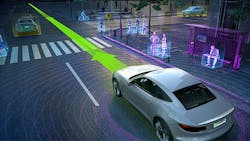American Drivers Begin Warming Up to Riding in Self-Driving Cars
American drivers are slowly warming up to the idea of relinquishing the wheel to a robot.
Although 63% of U.S. drivers say they’d be afraid to ride in a fully self-driving car, that’s down substantially from the 78% who were fearful a year ago, according to a survey released Wednesday by the American Automobile Association.
Younger drivers are the most open to the new technology, with less than half of millennials concerned about going driverless, the study shows. Almost three-quarters of women worry about riding in a self-driving car, while just 52% of men shared that concern.
As self-driving technology reaches roadways this year, convincing consumers to trust autonomous vehicles remains a hurdle, and U.S. Transportation Secretary Elaine Chao has called on companies developing driverless cars to educate the public on their safety. The AAA survey shows an improvement in public perception in just a year’s time but also reveals that total trust remains a work in progress: Just 13% of U.S. drivers say they would feel safer sharing the road with a driverless vehicle while they’re driving a regular car, while nearly half would feel less safe.
“Education, exposure and experience will likely help ease consumer fears,” Greg Brannon, director of AAA’s automotive engineering and industry relations, said in a statement.
Meanwhile, American drivers are less worried about their own skills behind the wheel. Almost three-quarters of U.S. drivers told AAA they consider themselves above-average drivers, with 79% of men and Baby Boomers likely to rate their driving skills superior. That’s despite the fact that federal regulators report that 94% of all roadway fatalities in America are the result of human error.
“American drivers are very confident in their driving abilities,” Brannon said, “which may explain some hesitation to give up full control to a self-driving vehicle.”
By Keith Naughton
About the Author
Bloomberg
Licensed content from Bloomberg, copyright 2016.
